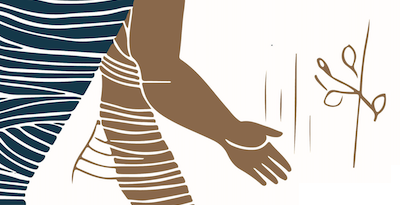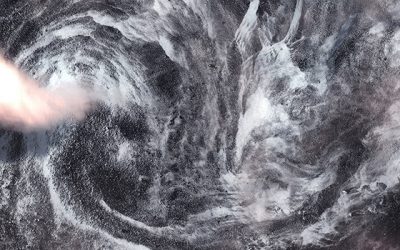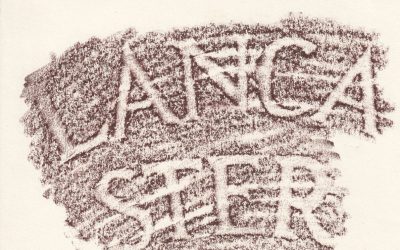The Mobility Futures Exhibition (2013) explored a future of tracking, connecting, observing and spatialising technologies. The works make visible flows of data and people within and across borders through the use of Twitter, surveillance camera footage, movement data, and the creation of games and archives. Through the dynamics of social connection and spatial movement future mobilities of urban life, food production, climate change, migration and communication are revealed. The exhibition was curated by Jen Southern, and supported by the LICA Technical team at Lancaster University.
Exhibition
Contingent Movements Archive – Hana Husberg, Laura McLean & Kalliopi Tsipni Kolaza
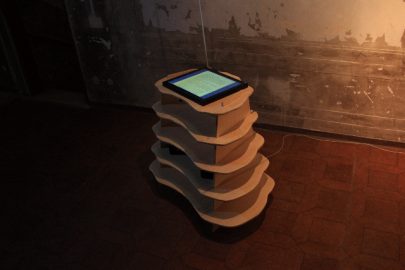
CMA is a project developed by artists and curators Hanna Husberg, Laura McLean and Kalliopi Tsipni Kolaza. The project has partnered with Maldives Research, a non-profit NGO, whose main objectives are to contribute to the process of developing public policy in the Maldives and with Goldsmiths College. CMA is conceived as a digital archive and film speculating on the future of the Maldives, which due to sea level rise is predicted to be submerged within the next hundred years. This project will be presented at the Maldives Pavilion of the 55th Venice Biennale, hosted by Chamber of Public Secrets, a production collective of critical art and culture.
AZ: Move and Get Shot – Joana Moll
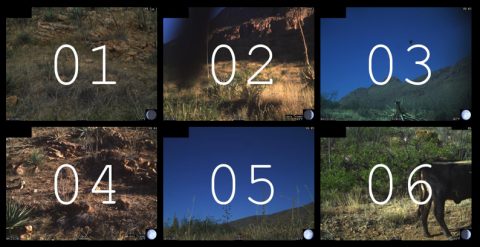
“AZ: move and get shot” is a net based piece which shows the human, animal and natural mobility flows in the landscape of the U.S. / Mexico border in the state of Arizona, through the eyes of six surveillance cameras. These cameras are part of an online platform created by a group of landowners with properties in the U.S. border. The platform shows the images of six surveillance cameras located in the border territory. The main purpose of this community is to provide the public with raw images of immigrants crossing the border illegally through their lands. Each camera incorporates a motion sensor which triggers the capturing of images when detecting the slightest vibration of the landscape. Then, these pictures are sent to a server and displayed directly on the web page.
Playing to Grow: Augmenting Agriculture with Social Impact Games – Misha Myers
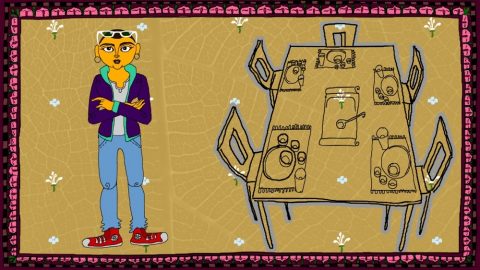
Playing to Grow explores the use of computer games as a method of storytelling and learning to engage urban users in complexities of rural development, agricultural practices and issues facing farmers in India. The primary business of the project’s partner, Digital Green, is to generate and disseminate videos co-created with farmers for farmers about sustainable farming practices. These videos provide a window into the world of small and marginal farmers in India. As partof an AHRC and British Council UnBox Fellowship, the research team worked with DG to conceptualise a computer game aimed at promoting an understanding of small farmer’s lives.
INmobility – Luisa Paraguai & Paulo Costa
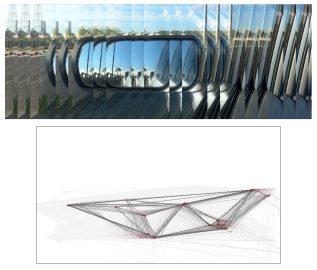
The INmobility project is a collaborative artistic process, developed by Brazilian artists Luisa Paraguai and Paulo Costa, which deals with contemporary textualities and visualities. The proposal of narratives produced is to visualize actions as ways to perform everyday activities in big cities, and so, modes of perception and reading the surrounding space. In an effort to understand time and space relationships in urban spaces, the INmobility project reorganizes images of people’s daily paths and routes in the city of São Paulo in visual narratives. Its visual interface consists of two parts interconnected by computing language – the MobMesh algorithm [co-authored with Paulo Costa and Luisa Paraguai]. The top features image compositions with users’ photographs from the city of São Paulo, while the bottom presents graphs or mathematical triangulations resulting from real-time analysis (tracking) of the image’s flow of vehicles from urban online webcams. The two dynamic modes of visualization are simultaneous and make visible instantaneous states of flow, understood as physical mobility (people displaced in space and time) and informational density (data accessed and uploaded remotely on the Web).
Mobile In-Materiality – Jonny Huck, Paul Coulton, Duncan Whyatt
The data used within this work was supplied as part of the Orange Data For Development Challenge and relates Orange phones calls in Ivory Cost (Republic of Côte d’Ivoire) during 5 month period from December 2011 to April 2012).
Films
Offshoring (2013) – John Urry
Offshoring the animation summarises the key themes of the book Offshoring, written by John Urry. The film will be used to promote the book which is due to be published by Polity Press early in 2014. The book examines the ways in which activities are moved from one jurisdiction to another to avoid laws, taxes, rules and regulations.
Today in Warsaw, Tomorrow Whatever (2013) – Grzegorz Brzozowski (director)
Two cups of hot chocolate with chilli, an illegal rubbish dump, men’s socks on the hardwood floor and a jam doughnut. What does intimacy mean in the times of global mobility? Vera from Germany and Stephane from Belgium met in strange, cold Warsaw, to explore together the Praga district on the right side of the Vistula just for one day. They were brought together through Erasmus and couchsurfing. Grzegorz Brzozowski, director of the documentary presents the curses and blessings of a united Europe, which may, or may not, bring people closer together.
The film was produced within the frame of DOK PRO Documentary Programme held by Wajda School. Duration: 20′
A Place to Take Away (2012) – Felippe Schultz Mussel (director)
Rio de Janeiro, 2011. The favelas of Rio are worldly advertised as stage to social distress in Brazil, but still surprisingly hold their place as some of the most seductive scenarios in the city. By immersing in tours through Favela da Rocinha, the documentary investigates the desires and images involved in the construction of such a popular touristic destination. It’s a market which, by keeping up with the demands, unceasingly projects new attractions.
Workshops
Playing to Grow: Augmenting Agriculture with Social Impact Games – Misha Myers
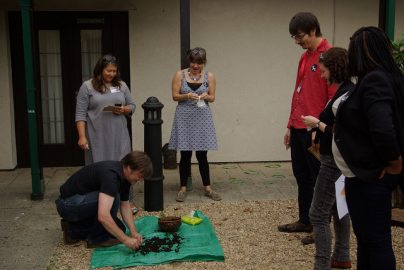
This workshop explores how game technology, design properties and mechanisms might be most effective at promoting change-related agendas and learning about complex systems of mobility or immobility. Participants are invited to take part in a live action playtest of the social impact game ‘Crop Cycle’ designed to promote a better understanding of the reality of farmers’ lives in India. Within game play players are invited to view videos made by Indian farmers on sustainable farming practices and problem-solve real life issues facing farmers. The live action prototype that will be presented in this workshop was created as part of a British Council and AHRC UnBox Fellowship in India in February 2013. The project team researched and experimented with various game mechanisms to create a game concept, which they will now develop further into a digital prototype for an online platform with the project partner Digital Green as part of the AHRC funded follow on project ‘Playing to Grow’. The original ‘Crop Cycle’ concept and live action prototype was created by Saswat Mahapatra, Misha Myers and Joshua Oliver with Digital Green. This workshop will be facilitated by Misha Myers, lead researcher of ‘Playing to Grow’.
Supported by a Catalyst artists bursary (www.catalystproject.org.uk)
Audio-Mobile: Locative Soundscapes – Sam Thulin & Owen Chapman
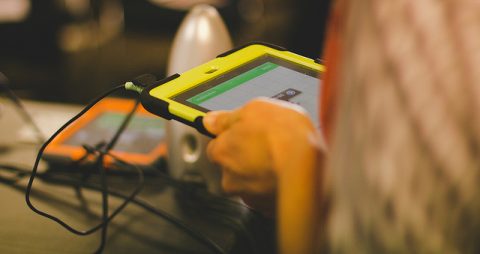
During this workshop participants will be invited to try out the Mobile Media Lab’s smartphone and tablet application, Audio-Mobile. Audio-Mobile allows users to make dynamically GPS-tagged audio-recordings and upload them to an online database, contributing to the creation of a web-based soundmap that shows the paths (rather than a single point) users took while making their recordings. Workshop participants will explore and make recordings in Lancaster, collectively building a soundmap of their trajectories in the area. The workshop will focus on different approaches to thinking about sound and mobility, drawing on important practical and theoretical work from the fields of soundscape studies and mobilities research. Participants will also be introduced to another of the Mobile Media Lab’s projects, Echoscape, which provides users with an alternate way of experiencing the Audio-Mobile sound database as it offers 3D renderings of the environment and new possibilities for navigating and interacting with the audio files.
Landscape-Reactive Sashes: Walking with augmented senses – Nikki Pugh

Don a landscape-reactive sash and join a group of linked individuals for a silent walk around campus.
The sashes will receive data streamed from a central node and give additional haptic feedback on how built-up the immediate surroundings are. This digital layer forms an extension to the senses. How will it change your perception of the spaces you move through?


